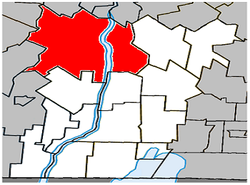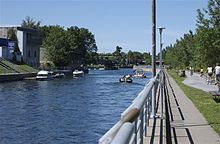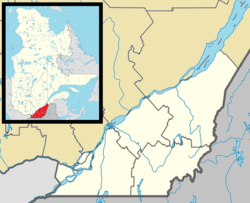Saint-Jean-sur-Richelieu
Saint-Jean-sur-Richelieu | |
|---|---|
| Ville de Saint-Jean-sur-Richelieu | |
 Downtown Saint Jean sur Richelieu | |
 Location within Le Haut-Richelieu RCM | |
| Coordinates: 45°19′N 73°16′W / 45.317°N 73.267°W[1] | |
| Country | Canada |
| Province | Quebec |
| Region | Montérégie |
| RCM | Le Haut-Richelieu |
| Settled | 1665 |
| Constituted | January 24, 2001 |
| Government | |
| • Mayor | Andrée Bouchard |
| • Federal riding | Saint-Jean |
| • Prov. riding | Iberville and Saint-Jean |
| Area | |
• City | 233.75 km2 (90.25 sq mi) |
| • Land | 226.93 km2 (87.62 sq mi) |
| • Urban | 53.80 km2 (20.77 sq mi) |
| Population (2021)[4] | |
• City | 97,873 |
| • Density | 431.3/km2 (1,117/sq mi) |
| • Urban | 88,083 |
| • Urban density | 1,637.3/km2 (4,241/sq mi) |
| • | |
| • Dwellings | 44,255 |
| Time zone | UTC−5 (EST) |
| • Summer (DST) | UTC−4 (EDT) |
| Postal code(s) | |
| Area code(s) | 450 and 579 |
| Highways | |
| Website | www.ville.saint-jean -sur-richelieu.qc.ca www.sjsr.ca |
Saint-Jean-sur-Richelieu (French pronunciation: [sɛ̃ ʒɑ̃ syʁ ʁiʃ(ə)ljø]) is a city in eastern Montérégie in the Canadian province of Quebec, about 40 kilometres (25 mi) southeast of Montreal, located roughly halfway between Montreal and the Canada–United States border with the state of Vermont. It is situated on both the west and east banks of the Richelieu River at the northernmost navigable point of Lake Champlain. As of December 2019, the population of Saint-Jean-sur-Richelieu was 98,036.[6]
History
[edit]Historically, the city has been an important transportation hub. The first railway line in British North America connected it with La Prairie in 1836. It also hosts the annual International Balloon Festival of Saint-Jean-sur-Richelieu, a hot air balloon festival which attracts thousands of tourists who come to see the hundreds of balloons in the sky each August.
The Chambly Canal extends 20 kilometres (12 mi) north along the west bank of the river and provides modern freight passage to Chambly and the St. Lawrence River. The canal has one lock near the downtown core of Saint-Jean-sur-Richelieu. In the winter, the city builds a skating rink on the canal near the lock. In the summer, the embankment on the east side of the canal has a 20-kilometre (12 mi) cycling path.

The French built Fort Saint-Jean in the seventeenth century. Known to early English settlers as St. Johns, it provided an important communication link during the French and Indian Wars. During the American Revolutionary War control of the town changed hands several times as British and American forces moved through the area.
In 2001 the city and several adjoining communities were merged into the new regional county municipality with a population to 79,600. This merger was requested by the five municipalities involved and was not part of the municipal fusions imposed by the Quebec government the following year.

Geography
[edit]Saint-Jean-sur-Richelieu is located on the banks of the Richelieu River. The city is the seat of Le Haut-Richelieu regional county municipality and of the judicial district of Iberville.[7]
Neighbourhoods
[edit]The city is divided in five sectors which refer to the former municipalities. Each sector contains different neighbourhoods:
| Sectors | Saint-Jean | Saint-Luc | Iberville | Saint-Athanase | L'Acadie |
|---|---|---|---|---|---|
| Neighbourhoods | Vieux-Saint-Jean | Saint-Luc ("le Village") | Vieux-Iberville | Les Mille-Roches | Vieux-L'Acadie (Village) |
| Saint-Gérard | Les Prés-Verts | Saint-Athanase | Saint-Athanase-Sud | Domaine-Deland | |
| Saint-Edmond | Talon | Saint-Noël-Chabanel | La Canadienne | ||
| Saint-Lucien | L'Île-Sainte-Thérèse | Sacré-Coeur | Ruisseau-des-Noyers | ||
| Saint-Eugène | |||||
| Notre-Dame-Auxiliatrice | |||||
| Notre-Dame-de-Lourdes | |||||
| Normandie |
Demographics
[edit]| Year | Pop. | ±% |
|---|---|---|
| 2006 | 87,492 | — |
| 2011 | 92,394 | +5.6% |
| 2016 | 95,114 | +2.9% |
| 2021 | 97,873 | +2.9% |
In the 2021 Census of Population conducted by Statistics Canada, Saint-Jean-sur-Richelieu had a population of 97,873 living in 42,913 of its 44,255 total private dwellings, a change of 2.9% from its 2016 population of 95,114. With a land area of 226.93 km2 (87.62 sq mi), it had a population density of 431.3/km2 (1,117.0/sq mi) in 2021.[9]
| 2021 | 2016 | 2011 | |
|---|---|---|---|
| Population | 97,873 (+2.9% from 2016) | 95,115 (+2.9% from 2011) | 92,394 (+5.6% from 2006) |
| Land area | 226.93 km2 (87.62 sq mi) | 226.63 km2 (87.50 sq mi) | 225.78 km2 (87.17 sq mi) |
| Population density | 431.3/km2 (1,117/sq mi) | 419.7/km2 (1,087/sq mi) | 409.2/km2 (1,060/sq mi) |
| Median age | 43.6 (M: 42.4, F: 45.2) | 41.8 (M: 40.7, F: 42.9) | 41.1 (M: 39.8, F: 42.3) |
| Private dwellings | 42,910 (total) | 42,036 (total) | 40,411 (total) |
| Median household income | $74,500 | $61,904 | $55,412 |
The amalgamated municipalities (with 2001 population) were:
- Saint-Jean-sur-Richelieu (37,386)
- Saint-Luc (20,573)
- Iberville (9,424)
- Saint-Athanase (6,691)
- L'Acadie (5,526)
Despite the fact that nearby Montreal is very racially diverse, in 2021 Saint-Jean-sur-Richelieu had a very large majority of white residents (~94.4%). 4.1% of residents were visible minorities and 1.5% identified as Indigenous.[15] The largest visible minority groups were Black (1.4%) and Latin American (0.8%).
French was the mother tongue of 92.5% of residents. Other common mother tongues were English (2.5%), Spanish (0.8%), and Arabic (0.5%). 1.4% claimed both French and English as first languages, while 0.4% listed both French and a non-official language.
68.9% of residents were Christian, down from 88.0% in 2011.[16] 62.3% were Catholic, 4.3% were Christian n.o.s and 0.8% were Protestant. 29.3% of the population was non-religious or secular, up from 11.7% in 2011. All other religions and spiritual traditions accounted for 1.8% of the population. The largest non-Christian religion was Islam at 1.4%.
| Ethnic and Cultural origins (2021)[15]
(Includes multiple responses) |
Population | Percent |
|---|---|---|
| Canadian | 37,430 | 39.1% |
| French n.o.s | 22,115 | 23.1% |
| Québécois | 14,165 | 14.8% |
| French Canadian | 8,260 | 8.6% |
| Irish | 5,165 | 5.4% |
| Caucasian (White) n.o.s+
European n.o.s |
3,460 | 3.6% |
| First Nations (North American Indian) n.o.s.+
North American Indigenous, n.o.s. |
2,625 | 2.7% |
| Italian | 2,115 | 2.2% |
| Scottish | 1,715 | 1.8% |
| English | 1,525 | 1.6% |
| German | 1,250 | 1.3% |
| Christian n.i.e. | 1,135 | 1.2% |
| Acadian | 1,015 | 1.1% |
| Census | Total | French
|
English
|
French & English
|
Other
| |||||||||||||
|---|---|---|---|---|---|---|---|---|---|---|---|---|---|---|---|---|---|---|
| Year | Responses | Count | Trend | Pop % | Count | Trend | Pop % | Count | Trend | Pop % | Count | Trend | Pop % | |||||
2021
|
96,835
|
89,580 | 92.5% | 2,385 | 2.46% | 1,310 | 1.35% | 3,010 | 3.1% | |||||||||
2016
|
95,114
|
88,535 | 93.08% | 2,315 | 2.43% | 810 | 0.85% | 1,980 | 2.08% | |||||||||
2011
|
91,400
|
86,635 | 94.79% | 2,415 | 2.64% | 755 | 0.83% | 1,595 | 1.74% | |||||||||
2006
|
86,075
|
81,445 | 94.62% | 2,110 | 2.45% | 510 | 0.59% | 2,010 | 2.34% | |||||||||
2001
|
36,745
|
34,350 | 93.48% | 1,255 | 3.42% | 270 | 0.73% | 870 | 2.37% | |||||||||
1996
|
35,825
|
33,985 | n/a | 94.86% | 1,080 | n/a | 3.01% | 260 | n/a | 0.73% | 500 | n/a | 1.40% | |||||
Economy
[edit]Saint-Jean-sur-Richelieu is home to the Carrefour Richelieu regional shopping mall which has 115 stores.[17]
Newer retail developments include Faubourg Saint-Jean, home to restaurants, services, stores, and a soon-to-open movie theatre.
The historic downtown area, which borders the Richelieu River and includes Richelieu and Champlain streets, is home to a variety of locally owned bars, restaurants, and shops.
St-Jean is a manufacturing centre for textiles, wood products, sporting equipment, and metal transformation. It hosts an Area Support Unit (ASU) of the Canadian Forces, which functions as a primary recruit and officer training establishment.
Infrastructure
[edit]The Ville de Saint-Jean-sur-Richelieu public transit system provides commuter and local bus services.
According to the 2016 Census, 22,840 residents, or 56.7% of the labour force work within the city. An additional 5,135 (12.7%) commute to Montreal, while 2,305 (5.7%) work in Longueuil, 1,440 (3.6%) work in Brossard, and 965 (2.4%) work in Chambly.
By contrast only 770 people commute from Montreal to work in Saint-Jean-sur-Richelieu every day, while 795 people commute from Longueuil, 780 commute from Chambly, 510 commute from Saint-Alexandre and 500 commute from Mont-Saint-Grégoire.[18]
Transportation
[edit]
The city is split in two by Autoroute de la Vallée-des-Forts (Autoroute 35) which goes north–south by going first through Saint-Luc district, then turns east just south of Pierre-Caisse Boulevard in Saint-Jean-sur-Richelieu district to cross the Richelieu River and to finally continue its way south through St-Athanase and Iberville districts. The highway continues south for some 24 km before ending at Saint-Sébastien, but it is expected to be extended all the way to the Canada-United States border at Saint-Armand (Highgate Springs, Vermont) in the future, and will then continue as Interstate 89 in Vermont.[19]
Saint-Jean-sur-Richelieu has its own municipal airport, Saint-Jean Airport, and is also close to Montreal Pierre-Elliot Trudeau International Airport.
The former International Railway of Maine runs through the town, now the connecting point for the Central Maine and Quebec Railway with the Canadian Pacific Railway. The former Saint-Jean-d'Iberville railway station, which until 1966 served the Ambassador to Boston and New York City and the Washingtonian to Washington, D.C., is now a preserved building.
Education
[edit]This section needs expansion. You can help by adding to it. (November 2014) |
The South Shore Protestant Regional School Board previously served the municipality.[20]
In addition to more than a dozen public elementary and secondary schools, St-Jean is home to two private schools, one English-language school, and two higher education institutions:
- Ecole du quatre vent elementary French school
- École Vision Saint-Jean, a trilingual (French-English-Spanish) primary school
- École Secondaire Marcellin Champagnat, a historically Catholic (now non-religious) high school
- Saint-John's School, the city's only English-language school, which serves students from Kindergarten through high school. Per Quebec law, only children whose parents attended English-language school are allowed to attend English school themselves; French is mandatory for everyone else.
- Royal Military College Saint-Jean (French: Collège militaire royal de Saint-Jean) serves as a one-year preparatory program for the Royal Military College of Canada in Kingston, Ontario. Original founded in 1952, it ceased being a degree granting military college in 1995 due to cuts to military funding. RMCSJ continued to provide non-degree college programs for French-speaking cadets of the Canadian Forces. The Canadian federal government reopened the military college at Saint-Jean-sur-Richelieu in the fall of 2007 to provide the full first year of university, equivalent to the Kingston program, for students with English- or French-language backgrounds alongside the college program.
- CEGEP Saint-Jean-sur-Richelieu, part of Quebec's CEGEP network, offering post-secondary, pre-university programs
Notable people
[edit]- Art Alexandre, professional hockey player, left wing for the Montreal Canadiens (NHL)
- Edward Antill, American lieutenant colonel who participated in the 1775 Battle of Quebec. Marries a Quebecker, and died there.
- Les Appendices, comedy group
- Diane Boudreau, writer
- Alexandre Boulerice, communication, adviser, community activist, journalist
- Gerry Boulet, rock singer with the Offenbach band
- Isabelle Brasseur, 1993 World Figure Skating Champion (Pairs), 1992/1994 Olympic bronze medalist
- Éric Bruneau, actor
- David Cadieux, Canadian champion heavyweight boxer
- Capitaine Révolte, music group formed in Saint-Jean-sur-Richelieu in 1998
- David Choinière, footballer for the Canadian Premier League side Forge FC
- Stéphane Crête, actor
- Jeff Deslauriers, professional hockey goaltender, former Anaheim Ducks (NHL)
- Denis Gauthier, former professional hockey defenceman who played for the Calgary Flames, Phoenix Coyotes, Philadelphia Flyers and Los Angeles Kings (NHL)
- Bernard "Boom Boom" Geoffrion, right wing hockey player, former Montreal Canadiens (NHL), considered one of the innovators of the slapshot
- Claude Giroux, wrestler
- Hélène Harbec, Canadian journalist and poet
- Israël Landry, teacher, musician, music merchant, editor-in-chief, consul
- Rina Lasnier, GOQ, Canadian poet
- Pierre Légaré, stand-up comic
- Jean Lemieux, physician, novel and short-story writer
- Antoine L'Estage, Canada's most successful rally driver, 10-time Canadian Rally Championship winner, North American Rally Cup winner and Rally X-Games participant
- Didier Lucien, Quebec actor of Haitian origin
- Félix-Gabriel Marchand, journalist, author, notary and 11th Premier of Quebec (1897–1900)
- Joséphine Marchand-Dandurand, journalist, writer, and feminist activist
- Claudine Mercier, comedian, singer, actress and impressionist
- Jean-François Mercier, comedian, screenwriter and television host
- Kevin Owens (FKA Kevin Steen), professional wrestler
- Jean-Marc Parent, comedian
- Danny Plourde, poet, novelist and professor
- Jean-Francois Quintin, hockey player, left wing for the San Jose Sharks (NHL)
- Claude Raymond was a major league pitcher and later a sports commentator.
- Aurélie Rivard, paralympic swimmer and multiple medalist
- Alain Rochat, Swiss footballer
- Joey Scarpellino, actor
- Ska/punk/reggae band Subb
- Valérie Tétreault, tennis player
- Pierre Tougas, watercolor painter
- Marie Turgeon, actress
- The Villeneuve family, racing drivers:
- Gilles Villeneuve, Canadian racing driver, brother of Jacques-Joseph Villeneuve (born in Berthierville) and father of Jacques Villeneuve
- Jacques Villeneuve, 1995 CART Champion, 1995 Indianapolis 500 Champion, and 1997 Formula One World Champion, NASCAR driver
- Mike Ward, comedian
See also
[edit]- Le Haut-Richelieu Regional County Municipality
- Sainte-Thérèse Island
- Rivière des Iroquois
- Chambly Canal
- Richelieu River
- Champlain and St. Lawrence Railroad
- Royal Military College Saint-Jean
- L'Acadie (former municipality amalgamated into Saint-Jean-sur-Richelieu in 2001)
- List of cities in Quebec
References
[edit]- ^ "Banque de noms de lieux du Québec: Reference number 92441". toponymie.gouv.qc.ca (in French). Commission de toponymie du Québec.
- ^ a b Ministère des Affaires municipales, des Régions et de l'Occupation du territoire: Saint-Jean-sur-Richelieu
- ^ Parliament of Canada Federal Riding History: SAINT-JEAN (Quebec)[permanent dead link]
- ^ a b [1], 2021 Census Municipal Data.
- ^ [2], 2021 Census Population Centre.
- ^ "Portrait de la ville". Ville de Saint-Jean-sur-Richelieu (in French). Retrieved 2020-07-05.
- ^ Territorial Division Act. Revised Statutes of Quebec D-11.
- ^ a b Statistics Canada: 2006, 2011, 2016, 2021census
- ^ "Population and dwelling counts: Canada, provinces and territories, and census subdivisions (municipalities), Quebec". Statistics Canada. February 9, 2022. Retrieved August 29, 2022.
- ^ "2021 Community Profiles". 2021 Canadian census. Statistics Canada. February 4, 2022. Retrieved 2022-04-27.
- ^ "2016 Community Profiles". 2016 Canadian census. Statistics Canada. August 12, 2021. Retrieved 2024-04-22.
- ^ "2011 Community Profiles". 2011 Canadian census. Statistics Canada. March 21, 2019. Retrieved 2014-03-09.
- ^ "2006 Community Profiles". 2006 Canadian census. Statistics Canada. August 20, 2019.
- ^ "2001 Community Profiles". 2001 Canadian census. Statistics Canada. July 18, 2021.
- ^ a b Government of Canada (2022-02-09). "Profile table, Census Profile, 2021 Census of Population - Saint-Jean-sur-Richelieu, Ville (V) [Census subdivision], Quebec". Statistics Canada. Retrieved 2023-01-14.
- ^ Government of Canada (2013-05-08). "2011 National Household Survey Profile - Census subdivision". Statistics Canada. Retrieved 2023-01-14.
- ^ "Carrefour Richelieu". The Westcliff Group of Companies. 2007. Archived from the original on 23 October 2011. Retrieved 28 December 2011.
- ^ "2016 Census". 29 November 2017.
- ^ Burks, Kiana (2023-10-11). "Key section of Canadian Autoroute 35 now open". www.wcax.com. Retrieved 2024-01-07.
- ^ King, M.J. (Chairperson of the board). "South Shore Protestant Regional School Board" (St. Johns, PQ). The News and Eastern Townships Advocate. Volume 119, No. 5. Thursday December 16, 1965. p. 2. Retrieved from Google News on November 23, 2014.



